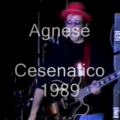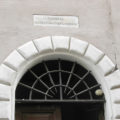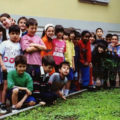I mentioned that I was going to be on TV, part of the audience on the Italian political talk show L’Infedele hosted by Gad Lerner.
Lerner showed far more political bias than he had in the previous show I attended (partly about Microsoft, partly about taxes – two inevitabilities of modern life?). My friend David Callahan and I were flattered to be specially shown to seats in the second row, stage right, until we realized that they had put us on the side of the cattivi (bad guys), as Lerner jokingly remarked. I was seated behind Gianni de Michelis, a long-time bastion of the Italian Socialist Party (abundantly disgraced by the Clean Hands anti-corruption investigations years ago), who had been Italy’s foreign minister for years during his heyday. Staring at the back of his greasy head for hours was not particularly edifying, his political opinions even less so.
The topic of the evening had been changed from “George Bush and Iraq” to “Are we winning the war [on terrorism]?” More broadly, should the war in Iraq ever have been started and have we (the Coalition) won it? There were several videomontages of recent violent events, with disingenuous voiceover narration. And, as I had expected, Giuliana Sgrena took part, remotely from a studio in Rome.
Someone had told me she wasn’t likely to participate, as she hadn’t given any interviews since her disastrous exit from Iraq, and was still recovering from being shot by American troops at a blockade as she was being carried away from her kidnappers (the Italian secret service officer who had secured her release was killed outright). But there she was, and, after so long a silence, she had plenty to say. As did everyone else, though few said anything sensible or surprising. This, too, was disappointing. Lerner picks intelligent guests from both sides of his topics, but these two groups were each entrenched in their own positions, and nobody was listening to anybody else.
The show was being broadcast live, with commercial breaks every 20 minutes. As break time approached, a young producer would hold up a sign for all of us to see: 4 minuti. 2 minuti. 60 secondi. Pubblicita’. These were largely ignored by whoever had the floor at the time, in spite of Lerner’s efforts (more determined in some cases than others) to shut them up. We missed one break by at least 10 minutes. Even on a TV schedule, Italians will be Italians… The show ran overtime by about 15 minutes, as is common for many live shows in Italy. Tivo would have a hard time working correctly here.
The one distinguished guest I felt any sympathy with was Anna Prause, seated on the “good guys” side. She had gone to Iraq with the Red Cross, then was hired by the Iraqi government to help set up the new Ministry of Health. As the situation for foreigners in Iraq deteriorated, she was eventually advised to leave, advice which she took only reluctantly.
When she finally got the floor, she exploded, saying that, while things in Iraq are still bad, and more dangerous than they were before, things are also better in many ways that are not understood or mentioned by the press. She gave an example: one of her tasks for the Ministry of Health had been to set up a new headquarters, planning everything right down to office fixtures and furniture. A year ago, she could not get her Iraqi colleagues to make a decision on anything even as minor as the color of the office furniture. Not because they were stupid or had no opinions, but because they were accustomed to watching carefully to see what opinions they were supposed to have, so that they could parrot those back to their political masters.
A year on, they not only had opinions, but were very happy to argue about them. This, she said, demonstrated an important change for the better in everyday Iraqi life, in spite of the ongoing violence. Is security more important than liberty? That’s a fundamental question which almost every country faces today. Personally, I come down on the side of liberty, but I’d like to hear from Iraqis themselves how they feel about it.
That evening forced me to confront and clarify my own very mixed feelings about what’s going on Iraq and how it all went down.
I always knew (who didn’t?) that Saddam was very bad news for the world and especially for his own people. He was a monster, partly of American creation, so the US had some responsibility to clean him up. The sanctions imposed after the first Gulf War caused tremendous suffering among the Iraqi people, without adversely affecting their “leaders”. I have mentioned my schoolmate who was married to an Iraqi and lived in Baghdad -through two wars – until her death from cancer last year. When I met Shahnaz and Achmed in 1996, Achmed’s salary as a schoolteacher was 3000 dinars a month: just about enough to buy a pack of cigarettes. Of course they couldn’t survive on that; their extended family, like everyone else in Iraq, was scraping along by selling off valuables and assets, and getting poorer all the time.
Yet Saddam seemed to have accomplished a sort of brainwashing (not surprising – as absolute dictator, he controlled all the media). People didn’t like him but, as Shahnaz insisted, “In Iraq we have a saying: better the devil you know than the devil you don’t.”
Post facto, it’s clear that most Iraqis didn’t feel that way, and are relieved to have got rid of the devil they knew for so long. So I can’t regret that the US military went in and removed him. I am, however, furious at how Bush & Co. lied, cheated, and manipulated the American people into agreeing to this, and then managed it so badly. There are plenty of other reasons to be angry at the Bush administration, but on this issue I may come out feeling much as I did about Reagan: I hated his methods and attitudes, but must, however grudgingly, applaud some of his results.
Dec, 2006 – No, never mind. Removing Saddam was never worth what’s happening now.








